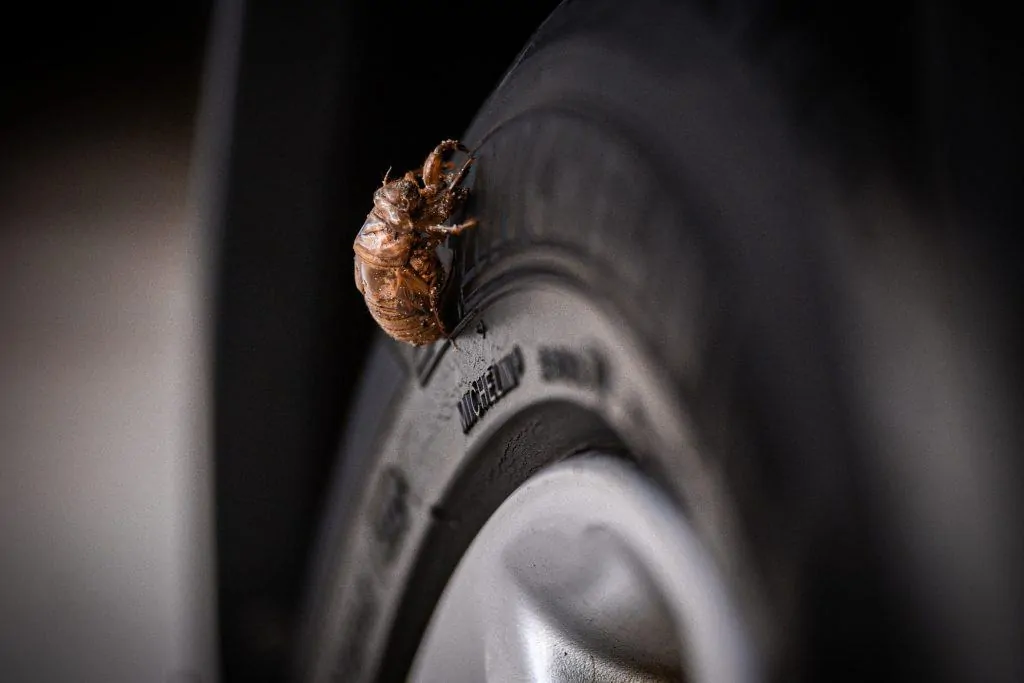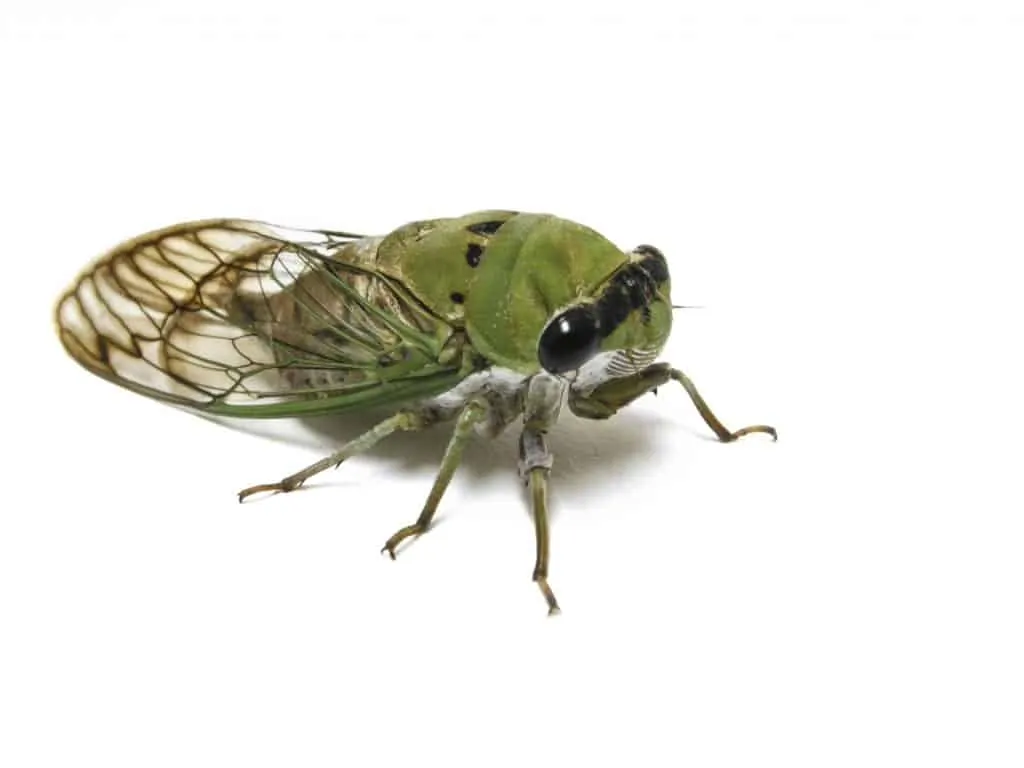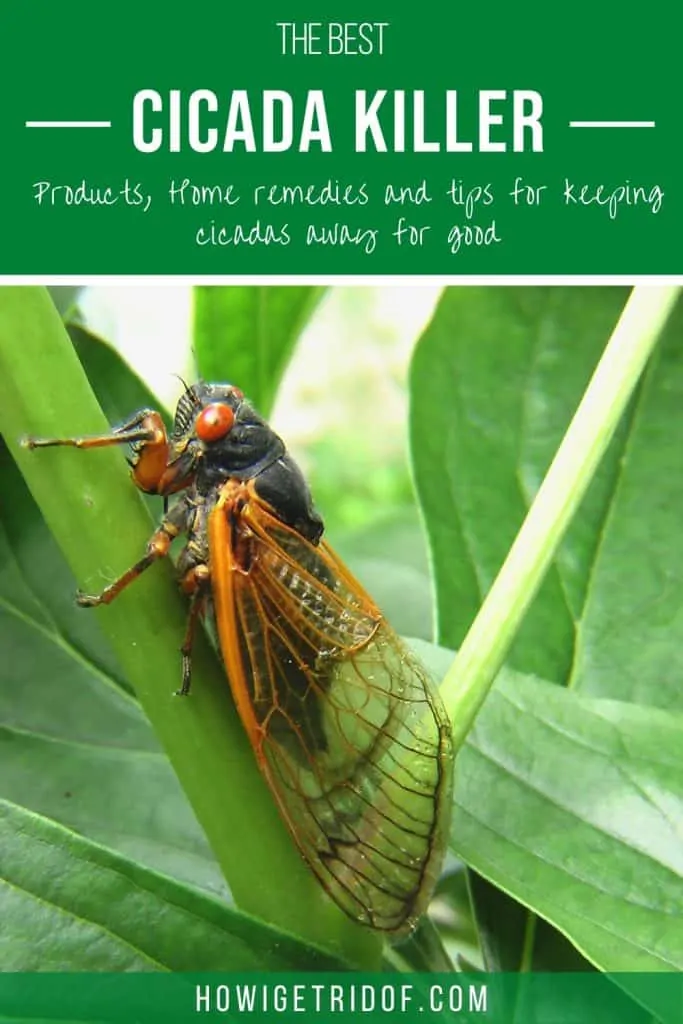Often confused for locusts, cicadas are some of the noisiest and most notorious insects in the United States, if not in the world. These large, flying insects spend most of their time as immature nymphs underground, and some species lay dormant for nearly two decades.
While cicadas are not dangerous to people or pets and don’t generally cause much damage to plant life, they can still be a nuisance, especially when they “sing” their loud cicada song.
And right now, the US is gearing up for one of the largest booms of cicadas in almost two decades. Are you ready to fight these singing pests off?
If so, you’ve come to the right place. Join us today as we learn more about cicadas and cicada killer, covering products, home remedies, and tips for keeping these loud and annoying insects at bay for good.
Contents
What Are Cicadas?
Cicada are large insects that spend the majority of their life in a nymph stage below ground.
Cicadas are large, flying insects in the order of Hemiptera. Scientifically known as Cicadomorpha, cicadas are most famous for their loud cicada song, which is produced by male cicadas during mating season.
There are an estimated 3,000 species of cicada insects throughout the world, and all are divided into two categories, including Periodic Cicadas and Annual Cicadas.
Periodical Cicadas
Periodical cicadas spend the majority of their life as nymphs underground before emerging from the soil to shed their skin and develop wings to mate. These cicadas are known as Periodical Cicadas due to their incredibly long development. In fact, these insects remain below the soil feeding on roots for anywhere from 13 to 17 years before emerging to mate.
In the United States, we are revving up for another boom in periodical cicadas as we speak, with a new brood preparing to emerge from the soil in the next year.
Annual Cicadas
When you’re looking for the best cicada killer, chances are you’re looking to get rid of annual Cicadas. Also known as Neotibicen, dog day cicadas, or jar flies, annual cicadas are the most common type of cicada in the United States.
They return annually as mature adults to mate and lay eggs, and while their nymphs do spend most of their life below ground, they return like clockwork every June before dying out in August.
The average life cycle of an annual cicada is around one to five years.
How To Identify A Cicada Problem On Your Property
Cicada nymphs emerge from the soil to shed their skin and develop wings. This is a picture of a newly emerged cicada nymph.
You’re certainly going to know if you need to invest in cicada killer – trust us. These pests are loud, which is the primary reason people find them so annoying. They also emerge in massive numbers, leaving behind piles of shed skins and shells in your yard and on your porch.
That said, cicadas are generally an outdoor problem, though they often return to the same location repeatedly. Because Cicadas prefer to live outdoors, it’s very rare you’ll wind up with a cicada infestation inside your home.
However, it is possible for these large pests to get into your house if you leave a door or window open. If you do find a cicada in your home, don’t worry. Though they are quite large, cicadas do not bite or sting.
So, just how big are cicadas?
Most cicada insects grow to be between two to three inches long once mature. Adult cicadas also have large, clear wings, and big black or red eyes. Nymphs, which you likely won’t see once they burrow into the soil, are wingless.
Aside from hearing the infamous cicada song during cicada season, you likely have cicadas and need to get a good cicada killer if you notice:
Shed Cicada Skin
Cicada nymphs tend to emerge in large groups, leaving behind shed skins so they can mature and develop their wings. You may find hundreds of these shed skins in your lawn and on your property after cicada nymphs have emerged.
That, coupled with the loud sound of cicada’s singing is a sure sign you need to get some cicada killer.
Emergence Holes In Grass Or Soil
If you have cicadas on your property, you likely have noticed some cicada holes in your soil or grass. These holes are large and often look similar to aeregation holes. These holes are also generally clustered below plant life like trees or shrubs.
Holes In Twigs or Trees
You may be able to pinpoint a cicada infestation and stop it before it starts if you’re especially vigilant and know what to look for. Female cicadas often create holes or cuts in trees and twigs, where they will insert their eggs.
The eggs then hatch and the newborn nymphs drop to the ground, where they quickly burrow into the soil.
If you can find these eggs on the trees or plants before they hatch, you may be able to stop or significantly reduce the severity of a cicada infestation before it begins.
Damage to Plant Life
Cicadas are not the most harmful insects to plantlife in the United States, but they can cause quite a bit of damage, especially in very large numbers. Their nymphs feed on roots below the soil while the female cicadas create holes in trees and twigs in which to lay their eggs.
In some cases, this can result in deformities in trees, but luckily cicadas rarely kill plants or vegetation. In fact, when it comes to plant damage or danger to people or pets, cicadas are relatively harmless.
Physically Seeing Cicadas
Last but not least, you’ll know you have cicadas when you see them. Of course, it’s important not to confuse them with locusts, who are actually related to grasshoppers and look and behave nothing like cicadas.
Why? Because locusts and cicadas require different treatment methods and preventative tactics.
Keep reading to learn more.
What Attracts Cicadas To Your Property?
Cicadas are attracted to certain trees and landscapes that allow them to lay their eggs. The above cicada nymph is about to shed it’s skin. (https://unsplash.com/photos/apeULoxGOUc)
Cicadas are most common in the eastern United States. They can cover very wide areas, but are most common in forests and fields as opposed to farmlands. The reason for this is because cicada nymphs spend so much of their life below the soil.
On farms, the constant turning of the soil creates inhabitable conditions for cicadas, leading most of them to invade suburban areas, especially properties near large green spaces or forests.
Cicadas are attracted to lots of vegetation and trees where they can mate and lay their eggs. In fact, some of their favorite trees include:
- Oak Trees
- Hawthorn Trees
- Pear Trees
- Cherry Trees
- Cypress Trees
- Ash Trees
- Maple Trees
- Willow Trees
Young trees and other fruit trees are also attractive to cicadas, as they are often easier for females to burrow their holes into so they can insert their eggs.
Interestingly, there have been studies suggesting that cicadas are also attracted to sounds we humans make during the summer. These noises include lawnmowers, weed whackers, leaf blowers, and more.
Female cicadas are especially attracted to these man-made sounds as they are often confused for mating calls.
But that doesn’t mean you should forgo your landscaping during cicada season. Instead, why not take a look at some of the best cicada killer on the market below?
Best Cicada Killer – Natural Methods
Though loud and annoying, cicadas are harmless insects and many people choose to use natural control methods to get rid of them.
Cicadas are certainly annoying and can even be damaging in large numbers, but the good news is that they are relatively easy to manage and get rid of if you are proactive and persistent.
While many residual insecticides can be an effective cicada killer, you also have the option of natural methods and remedies, which can be safer for people, pets and the environment.
Let’s go over a few of our favorite natural cicada killer products below.
Southern Natural Pyrethrin Concentrate
[amazon box=”B00VIALGTA” style=”light” title=”Natural Pyrethrin Concentrate” template=”widget” ]
The above insecticide is on our list of natural cicada killer products because it is derived from plant based ingredients including an organic chemical trom the chrysanthemum flower. It is fine to spray on vegetation and even edible garden plants including fruits and vegetables.
While it is safe to use outdoors and is generally considered an organic pest control option and cicada killer, this product can be harmful to people and pets if not used properly. Pets are especially sensitive to chrysanthemums, so keep this cicada killer stored in a safe space and use it only as directed.
MDX Concepts Peppermint Oil Insect Spray
[amazon box=”B07KBFBXVN” style=”light” title=”MDX Concepts Peppermint Oil Pest Control Spray” template=”widget” ]
You can use MDX Concepts natural pest control spray inside and outside of your home, but it is best used as a cicada killer outside and on contact. This is a safe spray you can use directly on plants, and it is harmless to people and pets.
However, this product is best used as a spot treatment for cicadas and will not be able to eliminate all of them.
EcoSmart Insect Granules
[amazon box=”B00332YC7Y” style=”light” title=”EcoSmart Insect Granules” template=”widget” ]
EcoSmart Insect Granules can help eliminate and control cicada nymphs in your lawn and soil when used properly. It is an organic and safe pest control option if you are looking for organic cicada killer, and it is fine to use in yards where children and pets play.
The granules also work to kill and control other pests including ants, beetles, roaches and more. It works using plant-based ingredients and oils and covers up to 5,000 square feet.
Tanglefoot Tree Banding Tree Guard
[amazon box=”B078CYVZC9″ style=”light” title=”Tanglefoot Tree Banding” template=”widget” ]
While the above tree guard may not be a cicada killer, it does help prevent and repel cicada nymphs from climbing up vulnerable trees to feed once they have emerged. You can use this tree band listed above in conjunction with other cicada killer and repellent methods to protect your landscaping and vegetation.
There are plenty of tree bands available but we specifically like the above tree band because it is discrete, weatherproof, and protects against a plethora of insects like gypsy moths, weevils, ants, caterpillars, cutworms and more.
Best Cicada Killer Using Insecticides
Cicada infestations can be quite large, and some people opt to use insecticides to control and prevent them.
While we do love using natural methods and remedies when it comes to cicada killer products, the unfortunate reality is that cicada problems are usually quite large. Since these insects congregate in massive numbers, using natural methods in conjunction with insecticides and even pesticides may be your best option when it comes to picking the best cicada killer for you.
That said, keep in mind that insecticides often use chemical toxins that are dangerous to people, pets and the environment and should only be used as directed. We should also note that certain pesticides may not be permitted in some regions and may only be allowed to be legally applied by professionals.
Make sure you do your research before purchasing certain products. And with that in mind, let’s take a look at some of the best insecticide cicada killer products below.
Bonide Pyrethrin Garden Insect Spray
[amazon box=”B0035HA0AK” style=”light” title=”Bonide Pyrethrin Insect Spray” template=”widget” ]
Most general insecticides and sprays will work as a good cicada killer, but we recommend using a garden-safe insecticide if you choose to use chemicals.
This is because most cicadas tend to congregate, mate and lay eggs on or near vegetation. We like Bonide Pyrethrin Garden Spray because it is safe to use on garden plants and lawns and is effective against cicadas, beetles, webworms, aphids and more.
Control Solutions Permethrin
[amazon box=”B0088Y7PJY” style=”light” title=”Control Solutions Permethrin” template=”widget” ]
Most permethrin insecticide sprays are going to do the trick when it comes to a good cicada killer, which is why we have listed the above Permethrin spray by Control Solutions. This spray also works against other tough insects like ticks, fleas, mites and flies.
You can use it outdoors but you should use it only as directed and with caution. Keep it out of reach of children and pets and do research before using this insecticide cicada killer on certain garden plants.
Ortho BugClear Insect Killer for Lawns and Landscapes
[amazon box=”B07YM5V2V5″ style=”light” title=”Ortho BugClear” template=”widget” ]
This cicada killer works for a number of garden and outdoor pests including spiders, ticks, fleas, and over 200 other garden pests. It lasts for up to six months, which isn’t extremely helpful for cicadas, but can be reapplied as needed to mesh with cicada season.
The spray covers up to 5,300 square feet and is safe to apply on plantlife. However, it does contain chemical ingredients that can be dangerous and toxic to people and pets. Use this spray only as directed and keep it out of reach of children.
Best Cicada Killer – Home Remedies
You can use home remedies like foil or tree guards to prevent nymph cicadas from climbing trees after emerging from the soil.
If you want to try your hand at do it yourself pest control when it comes to cicada killer, you’re in luck. There are a few methods you can use to repel these pests and protect your trees and landscaping from further damage.
Pick Cicadas From Plants By Hand and Use A Garden Hose and Water
Because of their large size, spotting single cicadas on plants and trees is simple. If you have some time on your hands and a garden hose, you can simply pluck or swat them off of the trees or vegetation and spray them with water. This is a time consuming but effective cicada killer option.
Cover The Base Of Trees With Foil or Sticky Tape
Cover your trees with sticky bindings to help collect and repel cicadas trying to climb up. This will not kill adult cicadas, who can fly, but it can stop nymphs from climbing up the trees to shed their skins and develop wings.
Pour Boiling Water Over Cicada Holes
If you have spotted cicada holes in your yard, try pouring boiling water over the holes. This will kill any nymphs inside and will also take care of potential cicada killer wasps, who have been known to infiltrate these holes in search of a meal.
Use Vinegar or Bleach
If you want to remove cicada nymphs from the ground, you can use vinegar. The vinegar will repel them from the soil and they will quickly emerge, making it easier for you to use a commercial cicada killer on them.
If you want to kill the cicadas in the holes, you can use bleach. While this may be an unorthodox method, it is an effective cicada killer. However, using bleach can be harmful to plants, people and pets, so use this method with caution.
Use Plant Netting
Using plant netting will not kill cicadas, but it will protect vulnerable plants and trees from hungry cicada nymphs and adults.
Plant netting is generally inexpensive and easy to find at most gardening or hardware stores. Plant netting will also protect plants from Asian lady beetles, potato bugs, and other plant-eating pests.
Use Essential Oils To Repel Cicadas
Essential oils can be used to evict cicada nymphs from their holes in the soil when poured directly into the holes, or you can make your own cicada repellent and cicada killer spray by combining the below essential oils and water or vinegar.
The best essential oils to repel or kill cicadas include:
- Lemongrass Oil
- Lavender Oil
- Peppermint Oil
- Thyme Oil
- Spearmint Oil
- Tea Tree Oil
To make your own cicada killer or repellent spray using the essential oils above, mix 10 to 25 drops of the essential oil of your choice with two cups of water in a spray bottle. You can also add a cup of vinegar if you wish, but be careful when spraying vinegar on certain plants.
The best essential oil for pest control tends to be peppermint oil, but many people have found that tea tree oil is also a top contender when it comes to cicada killer and control.
Are Cicadas Dangerous To People or Pets?
Yes, cicadas are massive and loud, but the good news is that they are completely harmless. They do not bite or sting, they’re not poisonous or venomous, and they’re actually relatively clumsy.
The only way they might be dangerous to pets is if pets eat a bunch of their shed skins. While a few shed skins won’t hurt pets, consuming quite a bit can cause digestive upset. Furthermore, some pets are more prone to choking on the large skins, which can obviously be dangerous as well.
When it comes to cicadas in the home, they only breed outdoors, meaning home infestations are practically nonexistent. Cicadas also don’t cause any major damage to plant life or structures. These insects are more of a nuisance than anything else.
Despite emerging in massive numbers and breaking your eardrums with their shrill singing, cicadas are considered a beneficial insect. They help aerate the soil, prune down trees and are an abundant food source for other important animals and wildlife.
How To Prevent Cicadas In The Future
Cicadas have plenty of natural predators, including birds, bats, rodents and reptiles.
Just because cicadas are good for the environment doesn’t mean you want them taking over your yard next time summer rolls around.
You can prepare yourself for the next cicada season by hanging on to some quality cicada killer as well as staying on top of preventative measures to keep these pests under control.
Take a look.
Prune Infested Branches and Trees
Cicadas emerge in early June, so as soon as you hear that telltale song, keep an eye on your vegetation. Prune infested branches and twigs that you suspect have cicada eggs inside, and dispose of them far away from your property.
This may not solve your current problem with cicadas but it will help reduce the emergence of numerous cicadas next season.
Turn The Soil
Remember, cicadas don’t like living on farms because the soil is constantly being disturbed. You can mimic this action by turning your garden soil often, especially below trees and plants that cicadas are known to favor. This will make the soil less habitable for nymphs and reduce the number of cicadas that emerge in the next cicada season.
Plant Gardens After Cicada Season To Protect Them
If you’re worried about cicadas infesting and damaging plants, we suggest waiting until cicada season has ended. Not only will this ensure your plants are able to grow up healthy but it will also reduce the number of mating and egg-laying sites female cicadas have, thus reducing the number of cicadas emerging from your soil in the next season.
Invite The Predators
If you’re looking for the best cicada killer, you may not have to look any further than their abundant list of predators.
Cicadas are on the menu for nearly every predator that eats insects, including but not limited to:
- Birds
- Rodents
- Bats
- Cicada Killer Wasps
- Spiders
- Scorpions
- Fish
- Reptiles
- Praying Mantises
- Cicada Assassins
- Assassin Bugs
- Lacewings
- And Even Possums
Depending on your region, you can look up how to attract certain predators to get rid of cicadas or at least greatly reduce their population once and for all.
Of course, make sure the cure isn’t worse than the problem. For example, inviting a possum to your property could lead to a slew of other problems, as could inviting birds, wasps, and rodents.
Last, try and remember that cicada season is relatively short. So, while you may not be able to fully control or get rid of cicadas even with the best cicada killer, don’t worry. They’ll be gone by fall and you’ll have a whole year to prepare for them next season.
Best of luck!


Jack founded our blog after two decades of working in the pest control industry. His vast experience dealing with a wide array of pests allows him to diagnose issues quickly and get to the heart of pest problems quickly and effectively. He has serviced more than 2,000 homes over his career and there is hardly any pest situation that he has not seen before.






